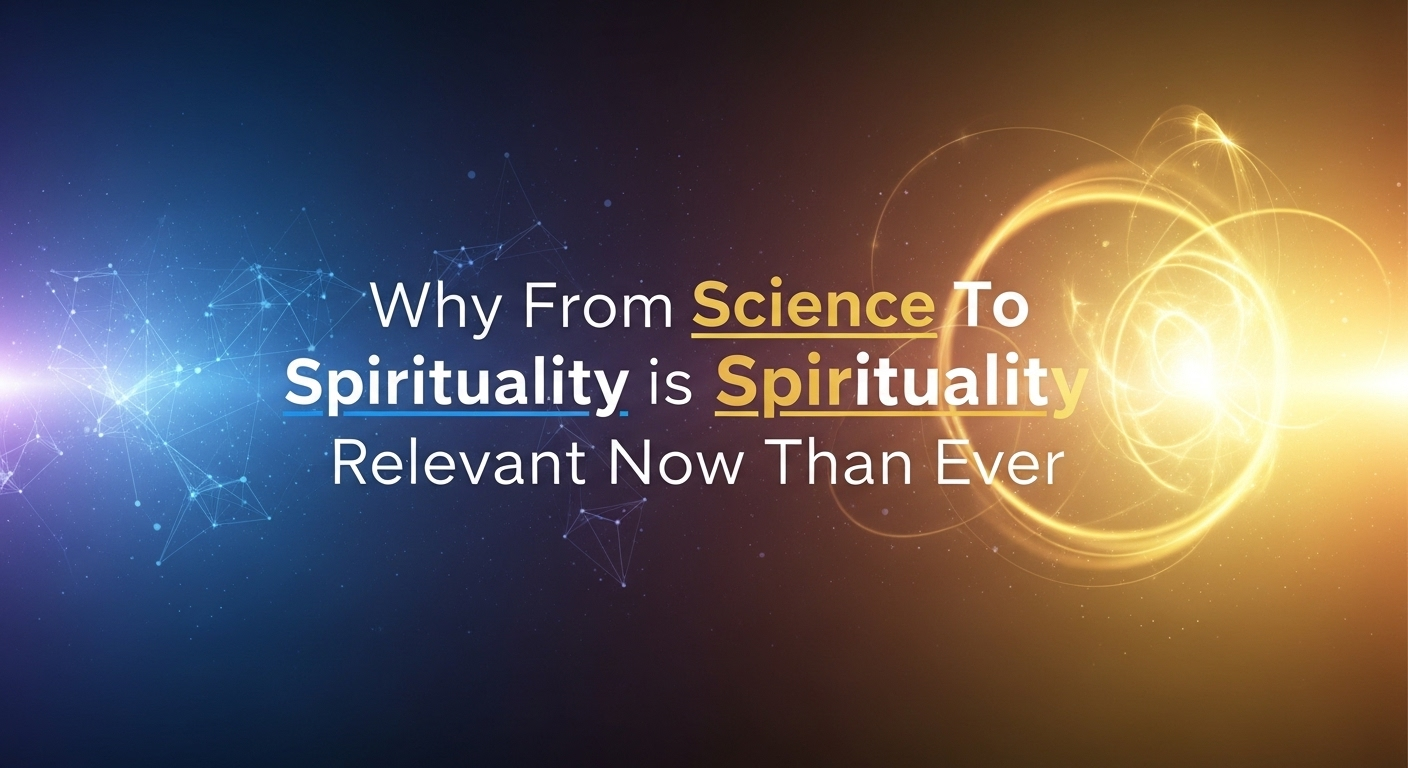Why From Science To Spirituality is More Relevant Now Than Ever

In an era where technological breakthroughs and existential questions coexist, From Science To Spirituality emerges as a profound bridge between empirical knowledge and inner wisdom. Written by Alvin J. Clark, this transformative work isn’t just a philosophical discourse; it’s a call to realign our understanding of reality. As humanity grapples with artificial intelligence, climate change, and a deepening quest for purpose, the message of From Science To Spirituality resonates louder than ever before.
But why is this intersection between scientific rigor and spiritual insight so critical today? Let’s explore how Alvin J. Clark’s visionary narrative is shaping modern thought and why his work is a must-read for seekers, scientists, and skeptics alike.
The Growing Divide Between Science and Meaning
Modern science has gifted us unparalleled advancements from decoding the human genome to exploring distant galaxies. Yet, amid these marvels, a glaring gap persists: a lack of existential meaning. For decades, science has shied away from addressing questions about consciousness, purpose, and the nature of existence.
From Science To Spirituality challenges this disconnect. Alvin J. Clark presents a compelling argument that science and spirituality are not opposing forces but two complementary lenses through which we can perceive the universe. His work invites readers to transcend the limitations of reductionist thinking and embrace a holistic worldview where logic and faith coexist.
Alvin J. Clark: The Scientist Bridging Worlds
What makes Alvin J. Clark’s perspective unique is his dual identity as a scientist and spiritual seeker. With a background steeped in empirical research, Clark doesn’t abandon scientific methodology. Instead, he expands it incorporating insights from quantum physics, neuroscience, and ancient spiritual traditions.
In From Science To Spirituality, Alvin J. Clark doesn’t ask readers to choose between facts and faith. He demonstrates how the latest scientific discoveries, such as quantum entanglement and non-local consciousness, point toward a reality far more interconnected and mysterious than classical science admits. His work is a refreshing antidote to the binary thinking that has long divided academic and spiritual communities.
The Rise of Consciousness Studies and Spiritual Science
One of the reasons From Science To Spirituality is more relevant now is the surge in consciousness studies. Scientists and philosophers alike are grappling with the “hard problem of consciousness” the enigma of subjective experience. How does inert matter give rise to thoughts, feelings, and self-awareness?
Alvin J. Clark’s exploration into consciousness aligns with this scientific curiosity, yet it ventures deeper. He proposes that consciousness is not a byproduct of brain activity but a fundamental fabric of reality. This idea, which echoes ancient spiritual teachings, is increasingly gaining traction in cutting-edge scientific circles.
In From Science To Spirituality, Clark argues that embracing consciousness as a primary element of existence could revolutionize not only science but also our collective sense of purpose. Such a paradigm shift is crucial as humanity faces moral and ethical dilemmas in an age of artificial intelligence and biotechnology.
A Blueprint for Inner and Outer Transformation
Beyond its intellectual appeal, From Science To Spirituality serves as a practical guide for personal and societal transformation. Alvin J. Clark emphasizes that true progress isn’t merely technological but deeply spiritual. He offers readers a blueprint to cultivate inner awareness, ethical responsibility, and a deeper connection with the cosmos.
As mental health crises, social fragmentation, and ecological degradation intensify, the holistic approach advocated in From Science To Spirituality becomes indispensable. Clark’s message encourages individuals to move beyond materialistic pursuits and foster a consciousness that respects all forms of life.
Why Millennials and Gen Z Are Embracing From Science To Spirituality
Younger generations are increasingly disillusioned with rigid institutions be it organized religion or mechanistic science. They seek narratives that honor scientific integrity while addressing their spiritual yearnings. From Science To Spirituality speaks directly to this demographic.
Alvin J. Clark provides a narrative that validates skepticism yet invites openness. His writing resonates with those who value critical thinking but refuse to accept a meaningless universe. By merging empirical evidence with metaphysical inquiry, Clark offers a path forward that feels both intellectually satisfying and spiritually fulfilling.
The Scientific Validation of Ancient Wisdom
One of the most compelling aspects of From Science To Spirituality is how it highlights the convergence between modern science and ancient spiritual wisdom. Concepts like interconnectedness, vibrational energy, and the illusion of separateness once confined to Eastern philosophies are now finding validation in quantum physics and systems biology.
Alvin J. Clark meticulously connects these dots, demonstrating that the mystical experiences of sages and the equations of physicists are describing the same underlying reality. This synthesis not only enhances scientific inquiry but also enriches our collective spiritual heritage.
Addressing the Ethical Implications of Scientific Advancements
As humanity ventures into uncharted territories of genetic engineering, AI consciousness, and space colonization, the ethical compass provided by spirituality becomes paramount. From Science To Spirituality serves as a crucial reminder that scientific power must be wielded with wisdom and compassion.
Alvin J. Clark doesn’t merely critique the pitfalls of unbridled scientific ambition; he provides a framework where technological progress is aligned with universal ethical principles. His vision is not about rejecting science but about infusing it with the moral clarity derived from spiritual consciousness.
The Role of From Science To Spirituality in Future Education
Education systems worldwide are at a crossroads. The traditional emphasis on rote learning and fragmented knowledge is increasingly seen as inadequate for preparing future generations. From Science to Spirituality offers an alternative educational paradigm, one that nurtures critical thinking, emotional intelligence, and spiritual awareness simultaneously.
Incorporating Alvin J. Clark’s principles into academic curricula could pave the way for a more holistic form of education. Students would not only learn scientific facts but also explore their philosophical implications, fostering a generation of thinkers who are as compassionate as they are competent.
Why Alvin J. Clark’s Work is a Must-Read for Thought Leaders
Whether you’re a scientist, philosopher, entrepreneur, or policymaker, the insights from From Science To Spirituality are profoundly relevant. Alvin J. Clark’s work challenges conventional paradigms and equips thought leaders with a framework to navigate the complexities of the modern world.
In an age where societal progress is often measured in GDP and technological milestones, Clark’s call for a spiritually conscious civilization is both timely and urgent. His book is not just literature; it’s a manifesto for a future where science serves humanity, not the other way around.
Conclusion: A Timeless Message for a Changing World
As we stand at the cusp of unprecedented technological and existential shifts, the message of From Science To Spirituality is more vital than ever. Alvin J. Clark masterfully bridges the gap between empirical inquiry and spiritual wisdom, offering a vision of reality that is both scientifically robust and deeply humane.
In a world yearning for meaning amidst material abundance, From Science To Spirituality serves as a guiding light. It challenges us to evolve not just technologically, but consciously. By embracing Clark’s vision, we are not only expanding our understanding of the universe but also redefining what it means to be truly human.




